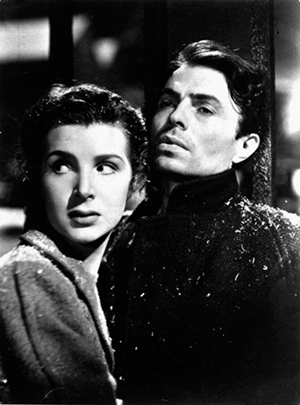By Film Noir Blonde and Mike Wilmington
“Odd Man Out” (U.K.; 1947, Carol Reed).
Carol Reed’s 1947 British thriller “Odd Man Out” is one of the great suspense dramas and one of the great film noirs. It’s an Irish odyssey that wrings every drop of tension from its subject. It’s also a story of love and death that plunges you into deepest night, and cracks your heart as you watch it.
The film revolves around Irish revolutionary Johnny McQueen, played by James Mason in a near-perfect performance.
As the film follows its dying protagonist – shot during an I. R. A. bank robbery and desperately trying to make his way to safety while being hunted by both the police and his friends – it creates an indelible portrait of a city at night, populated by a gallery of unforgettable characters.
That city is Belfast, though it’s never named as such. It’s a metropolis torn into bloody fragments, yet also seething with humanity, humor, embattled faith, bloody conflict and mad poetry. The city is stunningly photographed in rich blacks and ivory whites by cinematographer Robert Krasker in nearly the same palette he and Reed later used for 1949’s “The Third Man.”
Mason’s Johnny is not a naturally violent outlaw, but an idealist who is simply trying to hold onto life. The wounded IRA man runs a gauntlet of terror, escaping from the bank where he was shot, wandering from place to place, from homes to bars to city scrapheaps, constantly a fugitive, sometimes helped, often recognized, safe only for fleeting moments.
Johnny’s main contacts are his lover Kathleen (Kathleen Ryan), also loved by the stern police inspector (Denis O’Dea) on Johnny’s trail; the elderly, frail, art fancier Father Tom (W. G. Fay); and an opportunistic little man named Shell (F. J. McCormick), who lives in an attic with two fellow eccentrics – Robert Newton as the alcoholic painter Lukey, and Elwyn Brooke-Jones as the failed medical student Tober.
Johnny’s suffering keeps bringing out the best and the worst in the people he encounters. The first act of “Odd Man Out” is a near-Hitchcockian masterpiece of suspense. The final act hits a mixture of irony, poignancy and terror that few films reach.
Mason always considered Johnny his best performance, and it may well be – though other Mason performances are in the same class: Humbert Humbert in “Lolita,” Norman Maine in “A Star is Born,” Ed Avery in “Bigger Than Life,” Trigorin in “The Sea Gull” and Sir Randolph in “The Shooting Party.” McCormick’s Shell is a magnificent portrayal as well – beautifully restrained and sly, full of fallibility, weakness and a near-demonic will. You’ll never forget Shell even if you didn’t know or won’t remember this superb actor’s name.
The script, a gem, was adapted from his bestselling novel by F. L. Green, who was born in England and died (in 1949) in Belfast, and playwright R. C. Sherriff (“Journey’s End”). It was produced and directed by Reed, then at the peak of his powers as a filmmaker.
If you’ve never seen “Odd Man Out,” try to catch it this time: a great Irish drama and film noir, a great Carol Reed film and James Mason performance, and a great story of suffering and redemption, while running and hiding in Belfast, city of night.












From FNB readers